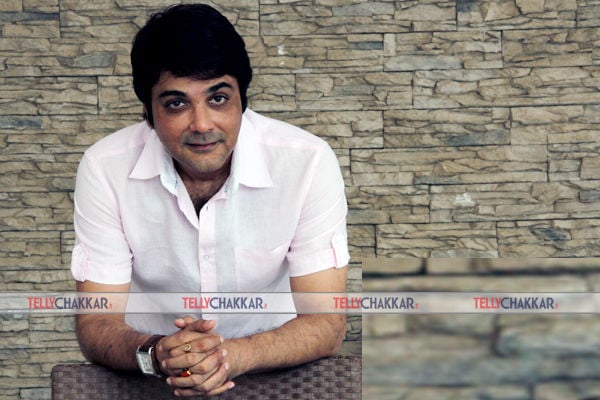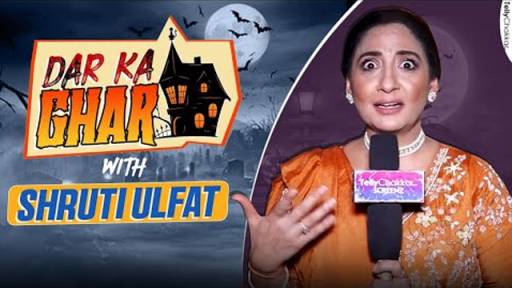Unfazed by the media glare he is getting for his role as Dr Ahmadi in Dibakar Banerjee’s Shanghai, Bengal superstar Prosenjit Chatterjee is not basking in glory. Instead, he is calm, composed and soft spoken.
<em>Tellcyhakkar.com</em> entered in a freewheeling interview with the talented actor. Excerpts:
<strong>Your role in Shanghai is being appreciated. How did you bag the role?</strong>
Submitted by
TellychakkarTeam
on
Sun, 06/24/2012 - 05:30

Unfazed by the media glare he is getting for his role as Dr Ahmadi in Dibakar Banerjee’s Shanghai, Bengal superstar Prosenjit Chatterjee is not basking in glory. Instead, he is calm, composed and soft spoken.
Tellcyhakkar.com entered in a freewheeling interview with the talented actor. Excerpts:
Your role in Shanghai is being appreciated. How did you bag the role?
(Pauses) I have been meeting Dibakar on and off asking him to do a Bengali film and always he used to reply “am planning”. Then one day, he suddenly called me up and wanted to meet me. When we did meet, he talked to me about Shanghai. Not getting the picture clearly, I asked him the reason for him approaching me. It took him two months to convince me before I could agree to play Dr Ahmadi. I took the film thinking that it would be a good film. I could not take an ordinary film taking into account that I was returning to Bollywood after a long time.
Did you start shooting immediately?
No, I, being a perfectionist, took as much as three months to report on the sets. Though I have no inhibition of returning back in a big way, I did not want to do the film just for the heck of it. In-between, for the matter, I attended a couple of workshops in Mumbai and Latur for 15-20 days.
You have been in the Bengali film industry for years now. How has the industry changed?
True, I started as a child actor with black and white films and have seen things changing with the advent of colour and later cinemascope. Previously, editing was done in the traditional way, then it started being done on an ARRI and now editing is done digitally. All said and done, it is technology that has been the key to all this change. Single screen theatres are slowly giving way to multiplexes.
Earlier, the average budget of a film used to be between Rs 20 to Rs 25 lakh. Now making a film costs anywhere between Rs 5 to Rs 6 crore. Today, a film is treated like any other product with professionals guiding the marketing strategy.
I have always advocated that cinema should be treated as an industry. That is why I decided to take on the task of heading the entertainment group of FICCI’s eastern region. I have been of the firm belief all along that with elements like culture and art; we should also keep the commercial aspect of a film on top of the mind. In short, there should be a blend of art and commerce.
As far as films are concerned, I can easily see that my film Autograph, changed the course of Bangla cinema. The film proved that good cinema can also draw good box-office returns.
Bengali films are nowhere when compared to other language films like Hindi, Malayalam, Tamil and Telugu in terms of revenue generation. What ails the film industry?
Your conception is wrong. There was a time when people thought that the Bengali film industry has been driven to the ground and that viewers were switching to films made in other languages. Yes, I admit that at some point our industry was headed in that direction, but the whole industry fought back and I consider myself as one of those soldiers who has spearheaded the change.
Off late, a spate of Bengali films has been doing exceedingly well and I feel because of that the Bengali film industry is looking up. I have even heard that filmmakers from Mumbai are veering round the makers of Bhooter Bhobishyot for the remake rights.
Secondly, we need to widen our base. If you make a movie in Tamil you can release it across the southern states plus there are a lot of Tamil migrants all across the globe but not so for Bengali films. In that sense, we have a smaller market to start with though overseas there are a lot of Bengalis. Having said that, we have a huge market in Bangladesh and things are bound to change if that market opens up.
Continue…
In this regard, things are moving positively. For example, Moner Manush, that was a joint venture between the two countries, was a huge success. I think the market will open up soon and it will be good for both the countries. Now we have to deal with two different entities for the two countries — with one releasing here and the other in Bangladesh. When that constraint is removed, we will be able to rise up to the standards of any other industry.
Otherwise too, both the Bangla and the Bangladesh film industry needs to come on a platform to widen the Bengali film base in the world. Undoubtedly, Bangladesh has many talented film personalities (artistes, directors, technicians etc) but the infrastructure there is very weak.
Just imagine there is only one multiplex in the whole country in Dhaka. Cinema halls are not well-equipped and most of them have an unhygienic atmosphere. All this will change with the unison of both the industries when the revenues will increase. In short, there is an urgent need to create a new industry of Bengali films. Bangla industry has to rock and someone has to take the lead.
As the convenor of the eastern region of FICCI Frames, don’t you feel the participation of corporate houses could change the face of Tollywood?
It is happening. FICCI is doing a lot in this regard. Now we have corporates like Reliance, Zee and Sahara actively participating in the film biz in West Bengal. All said and done, Sujoy Ghosh’s Kahaani has tremendously changed the face of the Bengali cinema. The need of the hour is to make small films with good content. This would ensure smooth movement of the Bengali film industry on the whole.
You have been producing many serials and now you have produced a film. As a producer what do you see as your biggest task?
Yes, I have just produced a film with a bunch of new actors. I have been trying to change the face of industry with fresh talent. My production house will not cast me in the lead. Instead, I am going all out to promote young artistes with films of good content.
Otherwise too, I keep on advising and mentoring people. It was I who told Sujoy Ghosh to make Kahaani in Hindi when he wanted to do the same in Bengali. My contention was that, making the film in Hindi would give a much wider platform for the film to be appreciated both visually and commercially. It was on my office table that we formalized the making. And now the results are there for everyone to see.
What new on the cards in Bollywood?
Well, Shoojit Sircar has approached me to star in his upcoming film Jaffna. Though my role has not been defined, I am doing the film.
Like

0
Love

0
Haha

0
Yay

0
Wow

0
Sad

0
Angry

0










Add new comment